Inside The Aftermath Of Ghana’s #StopGalamsey Protests
Protesters were arrested enmasse and whisked away to various police stations across the capital.
Protesters were arrested enmasse and whisked away to various police stations across the capital.
In September of 2023, hundreds of Ghanaians took to the streets of Accra to protest bad governance, high cost of living, and other social issues that have made their lives unbearable under the umbrella theme, “#OccupyJulorbiHouse.” The phrase, comprising the Ga words julor (the thief), and bi (the child), Julor-Bi, means “child of a thief.”
Organized by Democracy Hub (a pressure group in Ghana), the three-day protest began online with social media users calling for the government to fix a range of issues plaguing the country’s people. Between the 21st and the 23rd of September, the protests would move from social media to the streets of Accra. The demonstrations were, however, met with government pushback with hundreds of protestors and journalists being arrested and detained. Following the efforts of several lawyers, all detained protestors were released.
In the 12 months since #OccupyJulorbiHouse, the agitations for a better standard of living have continued, with the government’s unresponsiveness necessitating another major demonstration. As such, Democracy Hub put plans in place to stage a new round of protests from the 21st of September to the 23rd of September 2024. Among the issues that motivated this second wave of demonstrations was the pressing issue of galamsey, which means illegal mining. Galamsey has been in practice for years, and despite promises by the government, including the president, to stop Galamsey, nothing substantial has happened.
Faceless individuals encouraging galamsey would be stopped – Akufo-Addo assures https://t.co/1cWHwpAugH
— Nana Akufo-Addo (@NAkufoAddo) May 14, 2017
This past August, Ghana Water Limited reported on the impact that Galamsey was having on the country’s water supply, causing shortages and leading to various communities around the country having less and less access to clean water. In fact, in 2011, a report by BBC Africa stated that Ghana may have to import water by 20230 if illegal mining is not addressed. Currently, 60% of Ghana’s water bodies have all been polluted.
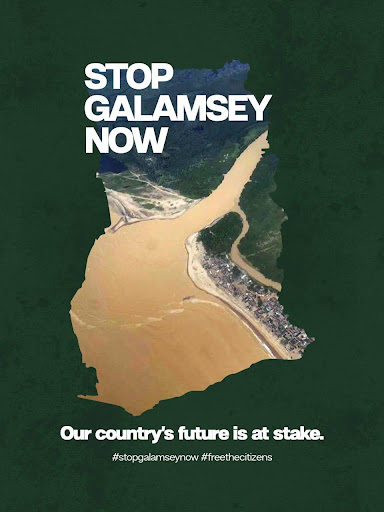
Days before the protests, the Ghana Police Service issued a communiqué announcing they had secured a court order placing an injunction against the protests. They would later reveal in an updated communique, a meeting with Democracy Hub where new routes for the demonstration were suggested. Despite the communique, the original plans for the protest would be greenlit by organizers who cited a lack of compromise and a rejected proposal to the Ghana Police.
By the afternoon on the September 21st, hundreds of protestors had gathered at the 37 Roundabout in Accra, with placards voicing their grievances. The low turnout did not deter those present, though, and the event helped put pressure on the government to take action against illegal mining.
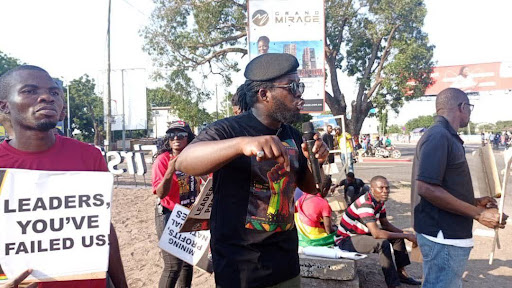 |
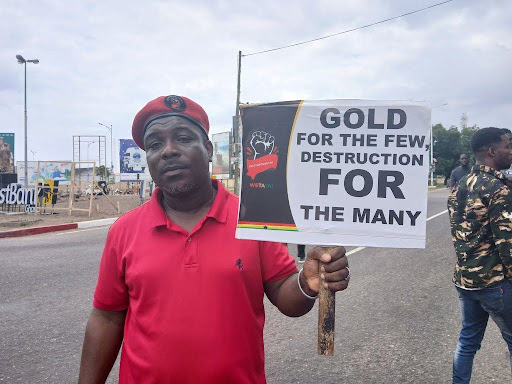 |
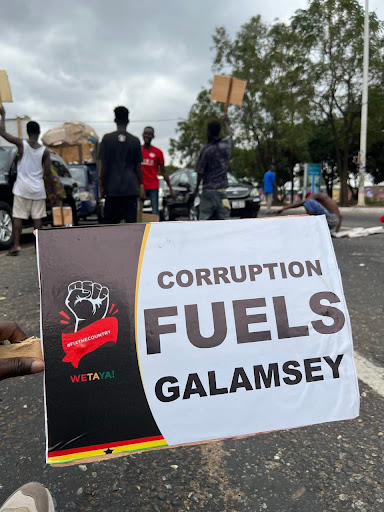
What began as peaceful soon turned sour when protesters were once again met with heavy police presence and pushback, reminiscent of what happened last year. Tensions rose, and protesters were arrested enmasse and whisked away to various police stations across the capital.
Unlike last year, the protestors who were arrested in this year’s demonstrations were put behind bars with no access to lawyers and quickly slapped with charges including conspiracy and unlawful assembly, causing unlawful damage, offensive conduct to breach of peace, assault on a public officer, and defacement of public notice. They were arraigned before the court without the prior involvement of lawyers who were moving across Accra trying to track the locations of the arrested protestors.
As Multimedia Group journalist Kenneth Darko told me, “A total of 51 people have been arraigned at the Circuit Court in Accra. As of today (26th September 2024), all have been denied bail and remanded into police and prison custody.” The detainees include a pregnant woman, an asthma patient whose family was denied contact even when they reached out with medication. Other detainees include Ama Governor, a lawyer, YouTuber, and activist; and fashion influencer Glenn Sam. All have been remanded until another court hearing on October 8th and 11th, 2024.
The detainees face eight charges, including conspiracy to commit a crime; namely unlawful assembly, unlawful assembly, causing unlawful damage, defacement of public notice, offensive conduct conducive to a breach of the peace, and assault on a public officer.
Protest convenor Oliver Barker-Vormawor faces all the aforementioned charges, along with an additional charge of stealing. Despite the arrests, he praised the coverage of the proceedings as a well-rounded affair, with everyone from traditional media to other digital and social media platforms putting their best forward and staying committed to presenting the facts of the developing story.
However, as a journalist and a citizen, Darko feels that the charges are unjust. “It has been challenging to separate personal feelings from some developments,” he says. “For instance, the remand of 11 individuals into prison custody seems extreme, especially since the justification stems from inadequate police facilities to house them. Some Ghanaians are questioning why bail wasn’t granted instead of treating detainees, who are still suspects, with such severity. This, among other issues, including the fact that one of the protestors present in court, Felicity Nelson, was not even listed among the accused, according to her lawyer, is quite embarrassing and creates room for further suspicion. The detention of the pregnant woman and the general detention of most of them for over 48 hours (which is unlawful) before arraignment do not speak well of Ghana’s democracy.”
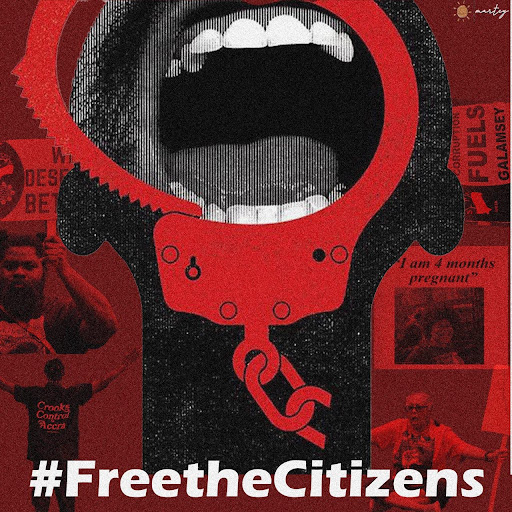
In the midst of all this, media outlets like the country’s Daily Guide have painted false narratives of the happenings in their reporting. The arrested protestors have been described as members of Ghana’s opposition party, the National Democratic Congress (NDC). Even worse, a committee from the Youth Wing of the ruling New Patriotic Party (NPP)has shown support for the arrest and called for the prosecution of those arrested while describing them as “hooligans.”
Ibrahim-Anyass “Mo” Muhammed Esq, a lawyer representing the detained protestors, believes that they are not being treated fairly. “I have been in court twice. On the 25th and 26th of September, 2024. My observation of the protestors is that they were not in very good shape,” he says.“Most of them were complaining about the lack of space and the terrible conditions of our cells. That is the general view of cells in Ghana. They are not very conducive places for anyone to be. But there were more pressing concerns about insects, and getting sick without anyone readily assisting them with medication or medical care. I have a client personally who has bemoaned the state of the cell, saying that he suffered an asthmatic attack and still did not get the help he deserves.”
With this year being an election year, Mo explained how the current climate would affect subsequent protests but reaffirmed the rights of Ghanaian citizens to embark on peaceful protests. “The public will be conscious of the process or procedure for embarking on peaceful protests, which the constitution confesses to all citizens of Ghana,” he adds.“This is an election year, so all types of protests or demonstrations will be scrutinized by law enforcement agencies. I think that is why we have seen this level of toughness from the police.
“The police, under the Police Order Act, have the discretion to provide you with the necessary tools – the mode of exercising your protest, the routes to use, and the means to achieve it. The police have sometimes abused the power in the mode of exercising the mode of protesting.”
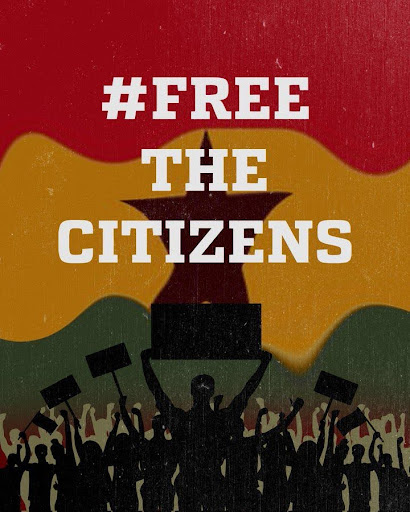
While the police have provided updates on matters pertaining to the protests, members of the media and citizens on the ground have poked holes in some of their statements. Particularly the arrest of one Benjamin, who was detained by the police as he was delivering essential products to arrested protesters, as reported by journalist, Olele Salvador. Additionally, a video posted by Joynews on X, shows a family of a detainee being denied access to give drinks and water to the detainee.
🚨ICYMI🇬🇭✊🏾👮🏿♂️: Ben (circled in this photo) is the same Benjamin mentioned in the tweet below who was arrested for delivering essentials to detained protesters. He wasn’t even at the protest. In fact, he was the one delivering the ‘Papaye’ meals to the protesters, which the police… https://t.co/QR8ECYJ4KZ pic.twitter.com/IJ7aMtL0Hs
— Ölele | DTS👨🏾🍳🇬🇭 (@OleleSalvador) September 27, 2024
For many young adults, the current happenings are a show of dictatorship, disregard for human rights, and abuse of power by the government. They feel betrayed by a government that has heavily disappointed them with their lackadaisical running of the country’s affairs, which has brought many to a breaking point. Seli, a friend of a detainee, shared how angry this whole process makes her feel. “It started off as a very scary thing, how ‘people in power’ decided to handle the protest. A group of old people somewhere suddenly feel threatened by a group of young, educated people. Protests happen every day in this country, but suddenly, it is this caliber of protests they choose to stifle and intimidate protestors. It is very upsetting seeing the way they [the leaders] have been moving, how they are blatantly disregarding human rights and disrespecting the law. Initially, it was scary, but now I am just angry at their audacity, feeling like they can get away with this. A friend of mine being a detainee was hard to come to terms with, but my friends have come together to create a community where we can cheer and console each other and be there for our friend.”
Mo asserts the need for trust between all parties and the system. “There is general distrust among citizens of the country and the hard lining in what happens to be partisanship treatment of the demonstration, where some people believe the protestors are agents of the opposition and the government does not believe there is genuine concern for the demonstration,” he explains.
“The protestors need to also express their frustration because the issue of galamsey is a national concern, and they feel they need to awaken the government. The effects of galamsey affect our lives as Ghanaians. I still believe protestors need to be treated fairly. The moment someone protests, it means there is a concern to be addressed. Any government should lend an ear to protestors and address them in due time but not immediately stampede with all the force of the state. We need a level of trust within the judiciary, the executive (police), and the citizenry.”
Seli also believes politicians need to understand their role in governance. “My perception of the government has not changed. I never thought they were good people. There is this misconception that ‘people in power’ are powerful, that they’re masters, but what they fail to remember is that they are servants, public servants. They are supposed to serve the people, and this has just reminded me of how much of a dissonance there is between what their actual job is and what they think their jobs are. This has proven to me that they are really committed to destroying and tearing this country apart just to fill their pocket.”
Across social media, people are calling out organizations, celebrities, and anyone of influence to draw attention to what is happening in Ghana. The push for the release of those arrested under the #FreeTheCitizens campaign on social media is quickly attracting attention, with another protest taking place from October 3rd to 5th to demand the release of the arrested protestors. With most of the detainees still awaiting their day in court, it’s left to be seen what the full ramifications of these arrests will be.
The issue of Galamsey should be treated as a national emergency and not peddled as political party disputes. The stance of the police and judiciary in handling this case sets a bad precedent that undermines the rights of the people and tenets of the constitution, which states the protocols that should be adhered to when it comes to issues like this. Sections of the youth, despite state pushback, remain committed to not only pushing for the freedom of the detained protestors but also a ban on Galamsey, among other pressing issues affecting the state of the country.

